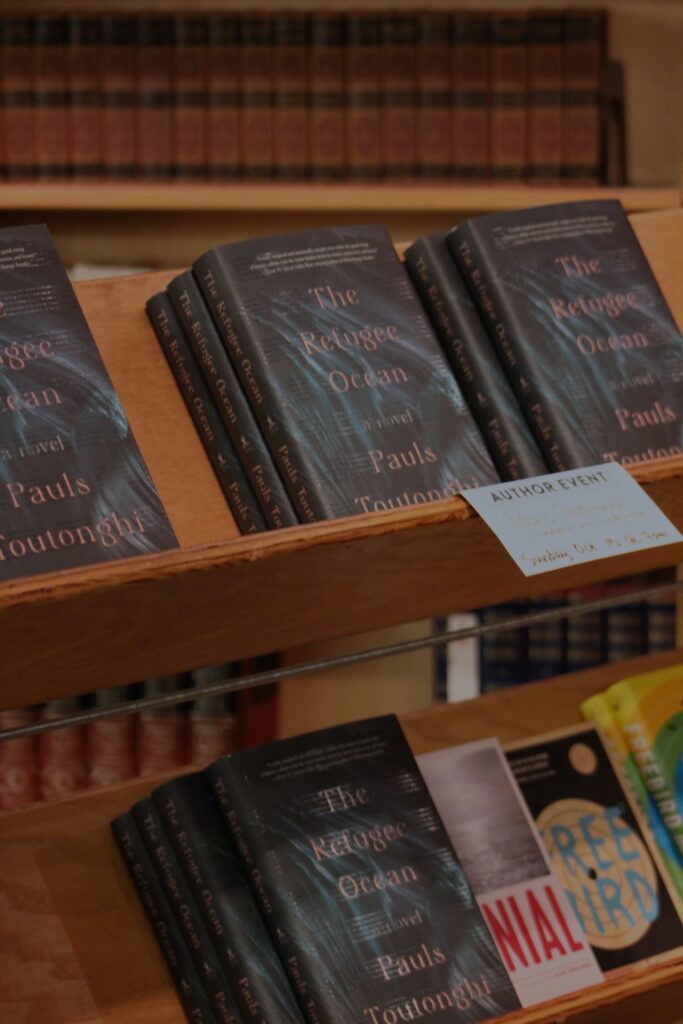Pauls Toutonghi is a fiction and nonfiction author and an English professor at Lewis & Clark. His work writing short stories, essays and novels explores familial relationships, cultural differences and human emotion. On Sunday, Oct. 15 at Powell’s City of Books Toutonghi discussed his recently published novel, “The Refugee Ocean,” with fellow author and screenwriter
Jon Raymond.
Over the course of the conversation, Toutonghi shared some of the parallels between his own family history and his fictional novel. Much of his writing process involved translating music and family documents from French to English, recalling his family’s stories told over weekend card games while growing up and revisiting earlier writings from his travels.
Many authors face the difficult decision of whether to write fiction or nonfiction when beginning their novel. When asked why he chose to write through the lens of fiction, he cited conflicting loyalties to his family, freedom of plot, dialogue and liberty to create
his own characters.
“There can be a larger emotional truth in fiction,” Toutonghi said. “If it’s nonfiction it has to be real.”
In the creation of “The Refugee Ocean,” he wasn’t limited by the facts of what happened. Much of his experience as a child of immigrant parents is reflected in the character Marguerite Toutongi, who also shares a version of his last name. Born in Beirut in 1922, Marguerite’s character and her story are untethered from the factuality of Toutonghi’s lived experience. The novel explores the possibilities of fiction by braiding together mercy, passions, betrayals, music and emotionality.
“Music plays an enormous role,” Raymond said.
He and Toutonghi highlighted the emotional weight that a soundtrack can bring to a story. Toutonghi alluded to the countless hours spent listening to music throughout the process of writing the novel. Rather than keep this part of his writing process separate from the story, Toutonghi decided to interweave songs into the story.
“I wanted to put into some tangible form the emotions they [the character] feel,” Toutonghi said. For him, incorporating music felt like a relatable way to achieve this.
One of the most engaging aspects of the conversation was each of the authors’ transparency in regards to the process of writing, editing and publishing a novel.
“The biggest challenge was persevering through the process of being turned down by editors,” Toutonghi said.
Raymond agreed, describing publishing a book as a “brutalizing process,” fraught with silence. Both authors acknowledged the importance of continuing to read, write and surround oneself with fellow writers and authors who can
relate to the journey.
Throughout the seven year process of drafting and writing “The Refugee Ocean,” Toutonghi’s vision for the book changed dramatically. He cut out entire sections based in Russia and Cuba, and narrowed down his novel from 400,000 words to
100,000 words.
“It was a tremendously different book,” he said. His newly published novel intertwines beautifully written themes of immigration, art and the human experience.
“I wanted to tell a small story that had bigger implications,”
Toutonghi said.
As an author and a professor, Toutonghi’s honesty about what it means to reflect, create and persist as a writer is well-earned. This glimpse into Toutonghi’s life as a writer beyond campus was a valuable reminder of the creative talent within our community.
Check out “The Refugee Ocean” from Watzek or pick up a copy at the bookstore and give it a read.
Subscribe to the Mossy Log Newsletter
Stay up to date with the goings-on at Lewis & Clark! Get the top stories or your favorite section delivered to your inbox whenever we release a new issue.



Leave a Reply